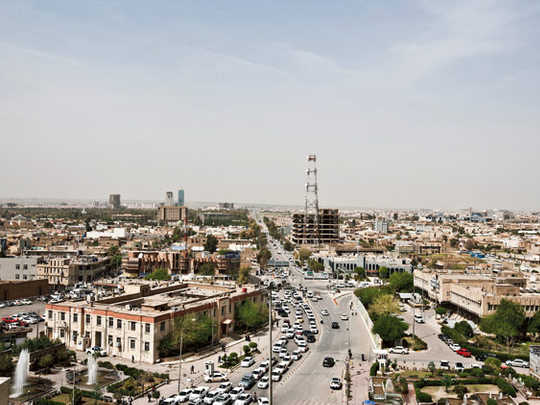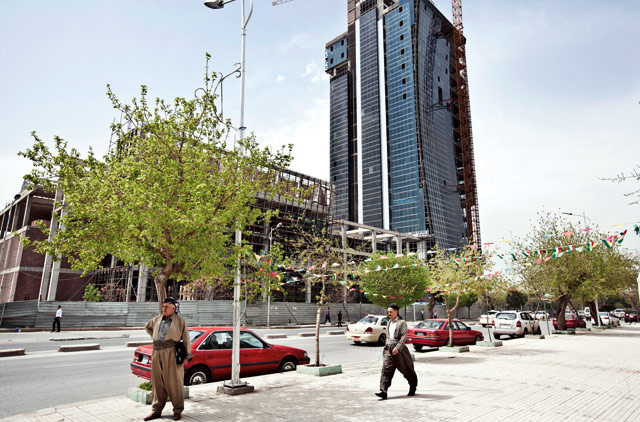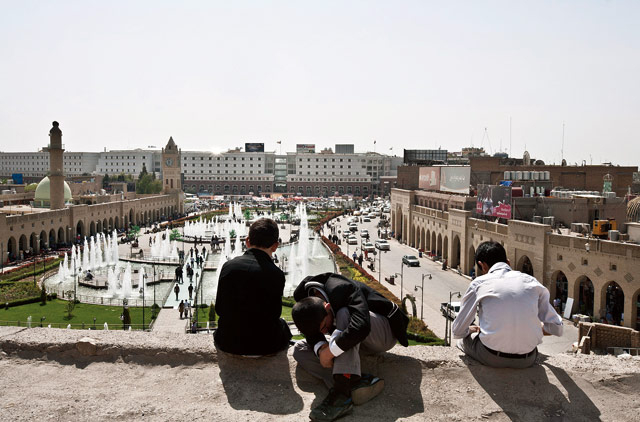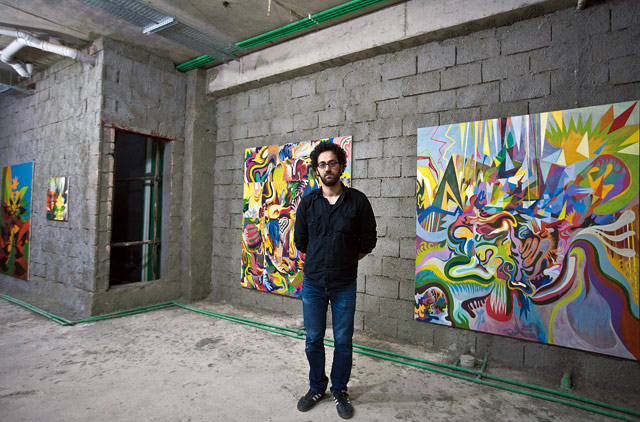
This place is growing faster than Dubai. In four or five years Kurdistan will achieve what the Emirates did in 20. You will not be able to recognise it,” says Cem Saffari. Looking down from the top floor of the 23-storey hotel where he works, overlooking a landscape dotted with construction cranes and new housing complexes, Saffari doesn’t hide his pride and satisfaction when asked why he moved from a comfortable life in London to a job in Kurdistan, in the north-eastern region of Iraq. “It’s a growing environment, which I like, and pioneers always win,” he says. “There is a certain amount of risk in investing here, but we believe the turnover will be higher.”
Saffari is the Turkish business development manager of the luxury Divan Hotel in Erbil, the capital of Iraqi Kurdistan. Open since May, the hotel is the Turkish group’s first investment abroad. With 228 rooms priced from $500 (Dh1,836) to $15,000 a night, the hotel aims to host the growing number of business travellers willing to invest in a region that is experiencing one of the fastest rates of economic growth on earth.
While the world was dealing with the global economic crisis, Kurdistan registered 8 per cent growth last year, driven by the exploitation of its gas and oil reserves estimated at 45 billion barrels. The region’s per-capita GDP, at around $6,000, is 50 per cent higher than in the rest of Iraq. Erbil is enjoying the lion’s share of a boom that has caused land prices to skyrocket. Housing complexes are springing up in the empty outskirts of the city, and some cost more than $1 million each. Shopping malls dot the city’s landscape and luxury brands like Porsche are finally coming in to town. The city’s stock exchange is scheduled to open in the coming months, together with a new business tower and several major hotels.
Erbil’s breathless growth has, not surprisingly, earned it the nickname ‘New Dubai’. However, local authorities would prefer Kurdistan to be known as ‘the other Iraq’ to highlight the stability and peace in the region – a stark contrast to the sectarian killings and daily bombings still ravaging the rest of the country. Observers feel the security the Kurdish Regional Government (KRG) has been able to provide is one of the main factors contributing to the economic boom. Kurdistan has its own security forces and the relative stability has made it a safe haven for those fleeing the sectarian violence in Mosul and Baghdad.
The region first gained political and military autonomy at the end of the First Gulf War of 1991, when the UN enforced a no-fly zone over the region to protect Kurds from Saddam Hussain’s brutality. However, it was only after the lifting of economic sanctions against Iraq in 2003 that the region’s economy began to bloom. “In 1991, Kurdistan was a big village,” recounts Fatih Ali Al Mudaris, economic relations advisor at the local Ministry of Trade and Industry.
“We had no telecommunications, no highways, just a couple of hospitals.”
In a clear sign of its growing economic importance, the region now hosts 17 consulates and foreign representations, seven universities and two international airports with direct links to cities like Vienna, Frankfurt and Stockholm. A new highway
is also being built between the two main cities of Erbil and Sulaymaniyah.
Today, Erbil boasts all the attractions of a modern city. Its seven shopping malls stock big brands like Rolex and Armani and a fun fair that is visited by some of the most prominent and wealthy local families. Pizzerias, Chinese restaurants and a sushi bar have now sprung up around the city, a go-kart track charges $20 a lap, and it’s not unusual to find couples lazing around the hills of Shanidar, one of the city’s three gigantic parks.
In a bid to diversify its economy, the regional government is now investing in tourism as well. The Citadel, the oldest continuously inhabited settlement in history that overlooks the bazaar and city centre, is now receiving a facelift. Inhabited since 2,300 BC, the ten-hectare area will soon be restored, turning its now crumbling houses into boutiques, restaurants and art galleries.
Iraq’s neighbours, Iran and Turkey in particular, have been quick to tap in to economic opportunities since the removal of Saddam Hussain. According to data from the Ministry of Trade and Industry, there are more than 1,000 Turkish companies and 300 Iranian companies registered there.
Today, Turkey is financing everything from construction to oil installations, from jewellery boutiques to food products. “Iraq was under an economic embargo for decades. When we opened up, we needed everything and Turkey was there with its expertise and quality,” says Al Mudaris.
Despite its opposition to the idea of an independent Kurdish state that might appeal to its own Kurdish population, Turkey has been willing to invest in Iraqi Kurdistan since 1996. Today, while many Western investors still associate Kurdistan with the dangers of Iraq, Turkey is reaping the fruits of its foresight.
Although the partnership is mainly economic, it might also serve Turkey’s political interests if, one day, Iraqi Kurdistan should become independent and start asking for the self-determination of the 28 million Kurds living in neighbouring Turkey, Iran and Syria.
“The Turkish plan was very clever: make this region economically reliant on them to thwart its political wings,” explains a foreign businesswoman living in Erbil, who asked not to be named due to the sensitivity of the issue.
However, building a Kurdish state has not been the main priority of the local authorities, not so far at least. Instead, the thrust has been on trying to develop and sustain long-term economic development. The lack of local expertise has partially slowed growth, forcing the Kurdish government to lure foreign players with a whole range of business-friendly regulations. These include ten-year tax exemptions, total ownership of companies and repatriation of profits, reduced-price land allocation for investment projects and an economic environment that has totally changed from the state-driven philosophy of the previous regime.
“In the Seventies and Eighties everything belonged to the government,” says Dara Al Khayat, president of the Kurdistan Federation Chambers of Commerce and Industry. “Now all the state companies have been privatised and our economy is definitely free-market oriented.” Al Khayat, a Kurd, is the owner of an economic empire that has expanded from a family-owned tailoring business to a holding company that manages construction companies, foreign brands, retailers and agricultural farms. He is among the richest men in Iraq and a living example of the economic possibilities this region can offer. Some local companies, such as the telecom giant Asiacell, have already expanded to other parts of Iraq, giving hope that Kurds will soon be able to take full advantage of their economic boom.
Despite attracting opportunities, there are still factors that discourage foreign investment in Kurdistan. A lack of local industries means that all building materials and some basic goods like processed food products are imported and expensive. Services like water and electricity have improved in the past few years, but the Erbil municipality is able to provide only 17 hours of electricity per day, while in the countryside, many villages don’t have power at all. Perhaps most troubling of all, the oil disputes between Kurdistan and the central government of Iraq loom like a dark cloud over the region’s future.
But even if the political strife has discouraged the majority of foreigners from doing business in the region, Kurdish authorities are confident that the stable and business-friendly environment will attract more investors.
“Here, anyone who has an idea can be the first one to put it in practice. It’s a virgin territory, not like Europe,” explains 30-year-old Jamal Penjweny, an artist and photographer turned entrepreneur. Originally a shepherd from the mountain village of Penjwen, he decided to move to Sulaymaniyah ten years ago.
Today, his activities range from being a consultant for oil companies to managing a small café in the city centre. Some of the photos from his recent collection, Iraq is flying, have been exhibited in major galleries in Europe and America. Penjweny is the perfect example of how a creative mind can succeed in the Iraqi Kurdistan of today.
“This place has changed a lot in the past ten years. Before, we weren’t used to thinking beyond these mountains,” he explains, sitting in the garden of his newly opened café in Sulaymaniyah. “Not only has the economy grown fast, but also the mentality of the people. We are now much more globalised than ever before.”
Though Erbil is the economic capital of Kurdistan, Sulaymaniyah can also stake claim to the region’s development. It is the cultural hub of the region, bustling with street cafés, art galleries and museums. The most important among them is the Amna Suraka (‘red jail’ in Kurd), a gloomy and threatening red building complex used by Saddam’s regime to detain and torture local political prisoners. Overrun in 1991 by local fighters, the prison has now been turned into a museum where chalk statues explain how torture techniques worked.
“Working here has a special feeling. This was one of the main places where Kurdish culture and identity was attempted to be wiped out,” explains Ako Ghareeb Maroof, the museum’s director and a Peshmerga, the term used to describe the Kurdish militia.
“But we continued to defend our culture, and we are still trying to do so.”















